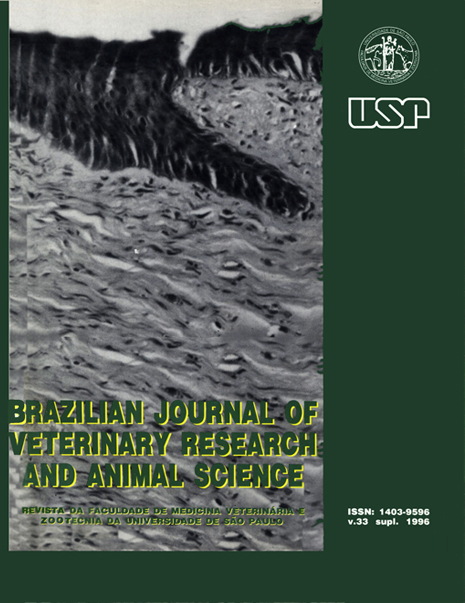Comparative study of resistance to tension of the peritoneus (equine, swine, bovine, and canine) fresh and conserved in glicerin
DOI:
https://doi.org/10.11606/issn.2318-3659.v33isupl.p305-312Keywords:
Peritoneum, Dogs, Horses, Pigs, Bovidae.Abstract
Several factors such as neoplasia, trauma, abscess and parasitic nodules can impair normal function of the organs. When it happens, it is often necessary to perform a surgical correction using implants made of biological membranes or synthetic material. Our objectives were to evaluate how glycerin 98% can influence the resistance and elasticity ofequine, swine, bovine and canine peritoneus to be used as implants, and to determine the nature of their histological structures. Standard pieces, 6 mm width - 50 mm lenght, both fresh and glycerinated for 15, 30 and 60 days were submitted to the ratio of maximum strength. Tests were carried out using Universal Assay Machine. Right after the strength tests, the membrane pieces were fixed in formaline and processed for histological examination after hematoxylin-eosin staining. Considering the stretching range caused by traction, data showed that the different membranes did not present the same resistance, and rupture points among the 4 samples were also different.
Downloads
Download data is not yet available.
References
Downloads
Published
1996-12-03
Issue
Section
ANIMAL PATHOLOGY
License
The journal content is authorized under the Creative Commons BY-NC-SA license (summary of the license: https://
How to Cite
1.
Batista LC, Daleck CR, Shimano AC, Alessi AC, Abrahão M de S. Comparative study of resistance to tension of the peritoneus (equine, swine, bovine, and canine) fresh and conserved in glicerin. Braz. J. Vet. Res. Anim. Sci. [Internet]. 1996 Dec. 3 [cited 2026 Mar. 3];33(supl.):305-12. Available from: https://revistas.usp.br/bjvras/article/view/50217





